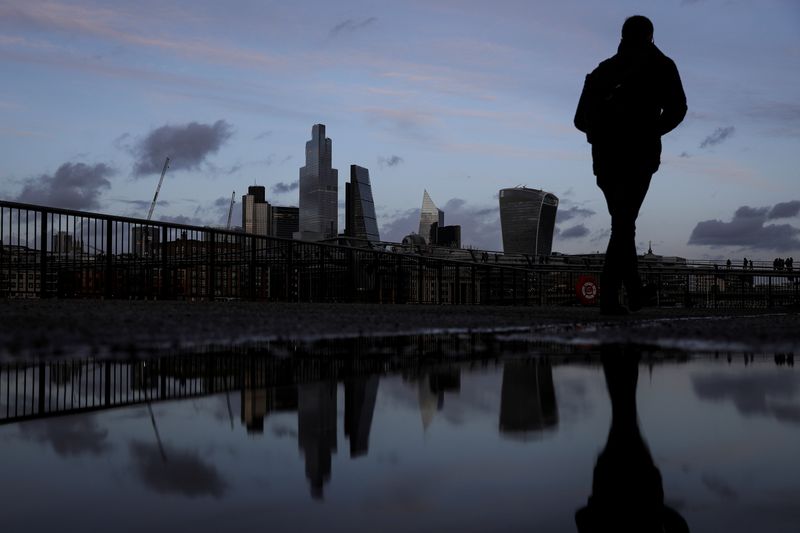LONDON (Reuters) – For anyone pondering how the coronavirus outbreak is about to deliver the British economy’s worst year in modern history, only a handful of things have wrought such severe and sudden damage in the past: weather, war and pestilence.
The Bank of England on Thursday put forward an “illustrative scenario” that saw a plunge in output of 14% in 2020 – albeit followed by 15% bounce-back in 2021 – the worst hit to the economy in more than 300 years.
“You are reaching back to the 18th-century data for a drastic fall like that,” said Stephen Broadberry, professor of economic history at Oxford, who helped the Bank of England compile economic data covering the past millennium.
Two very bad years stand out in Britain: 1706, a year of weak harvests and weak trade, when the economy contracted by around 15%, and 1709, the year of the “Great Frost”, when the economy shrank by 13%.
The probable cause? The weather, according to Broadberry.
HUNGER
“Weather-related activity is much more important in a poor economy where most activity is about getting the food on the table; bad weather hits the crops,” he said.
“When we go to the early 18th century we have to bear in mind that Britain is a relatively poor country – this is before the Industrial Revolution – and economic activity is dominated by feeding, clothing and housing the population and these are activities that are much more sensitive to the weather.”
(GRAPHIC-Britain’s biggest slumps link: https://fingfx.thomsonreuters.com/gfx/polling/qzjpqkadmpx/slumpo.jpg)
The wheat harvest plummeted in 1709. Famine in many European countries followed, against the background of what was then the most expensive war in history.
WAR
The War of the Spanish Succession, from 1701-1714, triggered by anxiety over the ambitions of Louis XIV of France, had monetary and economic consequences across Europe, disrupting the supply of silver from the Americas and trade in general.
“What is disrupting the British economy and the economy of much of Europe at this time is the background of unprecedented warfare,” said Linda Colley, professor of history at Princeton University.
“There are some interesting analogies with the present time,” said Colley, who cast Britain in the early 18th century as a divided country squabbling about everything from Europe, religion and politics to money, taxes and Scotland.
So the hit from the novel coronavirus looks to be the worst since then.
“There has been this unusually large period of 300 years during which the British economy has not suffered such major disasters and that is very uncommon,” said Albrecht Ritschl, professor of economic history at the London School of Economics.
“The really interesting question is: why was Britain so sheltered from later shocks – why that exceptionalism?” said Ritschl. “One of the reasons could be Britain’s position as the dominant world trader – it was almost perfectly diversified.”
PESTILENCE
Besides war or the weather prompting harvest failures in pre-industrial societies, the other economic battering ram is pestilence.
One catastrophic event stands out in European history: the plague that killed tens of millions in the 14th century and led to vast economic changes. Historians are still arguing about how many people in Europe perished.
“The plague lasts about a century because it keeps coming back,” said Broadberry. “Within the first three years, you have lost a third of the population – and then it keeps coming back.”
“The impact was absolutely enormous: if you survived, it was a bit like winning the lottery. Wiping out a third of population, but the amount of land and capital was unchanged, so each survivor had more capital and land. Real wages went up and, in the case of Britain, they stayed up.”
Another disaster is the 1918-19 influenza pandemic, which led to a vast loss of economic output. In the United Kingdom, it killed around 228,000 people, according to patchy data.
Such is the impact of the coronavirus – so called because it looked like a solar corona to the British researchers who in 1968 discovered the virus family in humans – that it is even changing the way historians view the past.
“We had this post-World War One recession and we all blamed it on monetary causes – the attempt to unwind wartime inflation and go back to the Gold Standard – but now we will probably have to rewrite history and say it was not money but really the Spanish flu,” said Ritschl.
(Reporting by Guy Faulconbridge; Chart by Andy Bruce; Editing by Giles Elgood)



















